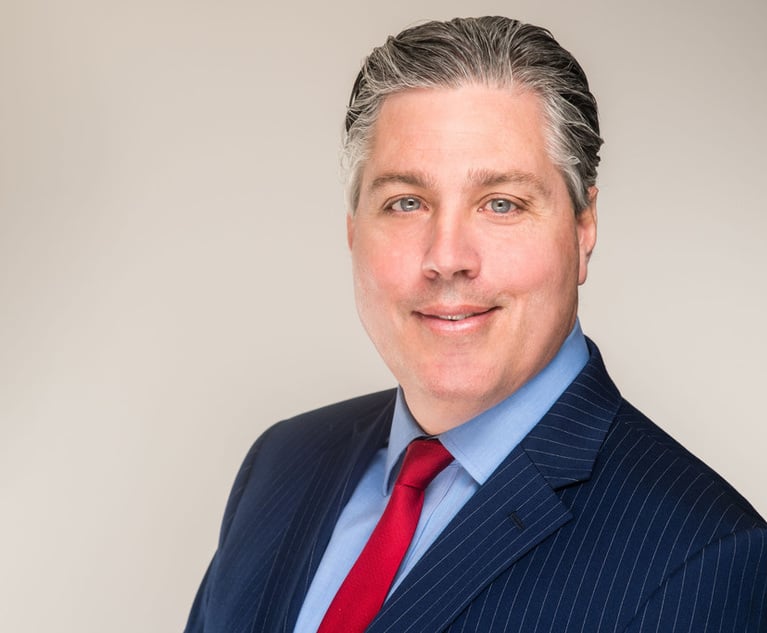Pa. Attorney’s Widow Failed to Prove Job Stress Caused Husband's Death, Court Says
The Commonwealth Court on July 29 affirmed the denial of workers’ compensation death benefits to a woman who claimed her husband died of a heart attack caused by “psychosocial stress related to his work as a workers’ compensation attorney.”
July 30, 2019 at 02:53 PM
7 minute read
 Credit: solarseven/Shutterstock.com
Credit: solarseven/Shutterstock.com
While the legal community is increasingly acknowledging the relationship between the pressures of the profession and stress-induced health issues, a recent Pennsylvania appellate ruling shows that proving the existence of such a link in the courtroom can be challenging.
The Commonwealth Court on July 29 affirmed the denial of workers’ compensation death benefits to a woman who claimed her husband died of a heart attack caused by “psychosocial stress related to his work as a workers’ compensation attorney.”
A unanimous three-judge appellate panel in Touchstone v. Workers’ Compensation Appeal Board (Touchstone and Associates) said a workers’ compensation judge did not err in denying claimant Teri Touchstone’s fatal claim petition filed on behalf of her late husband, Philadelphia attorney Andrew Touchstone, who died the night of Oct. 21, 2014, at age 51.
Teri Touchstone had argued that the stress of her husband’s job, and particularly the financial strain he had been under at the time, contributed significantly to his death.
But a WCJ ultimately determined that Teri Touchstone failed to provide sufficient evidence detailing the extent of her husband’s financial struggles and that her medical expert did not put forth unequivocal medical evidence establishing a causal link between Andrew Touchstone’s work-related stress and his death.
The appeals panel, led by Judge Renee Cohn Jubelirer, said the WCJ did not capriciously disregard evidence in reaching her decision.
“Rather, the WCJ, as fact finder, heard the testimony firsthand, made credibility determinations, and weighed the evidence presented,” said Jubelirer, joined by Judge Robert Simpson and Michael Wojcik.
Teri Touchstone presented testimony by Marc Vitale, a workers’ compensation attorney who had known Andrew Touchstone since 1991, according to Jubelirer’s opinion.
Vitale testified that Andrew Touchstone, who ran a small firm called Touchstone and Associates, rented office space from him and often worked late, sometimes even staying overnight, the opinion said. Vitale also said that Touchstone had always been friendly and gregarious until the last six months before he died, at which point he became short-tempered and angry. Vitale could not, however, recall more than one instance, in late 2014, when Touchstone paid his office rent late.
Teri Touchstone also put forth testimony by the lawyer who took over her husband’s cases after his death, Jeffrey Gross. Gross testified that Andrew Touchstone had been concerned and stressed that workers’ compensation court decisions in Pennsylvania were becoming more conservative and legislative changes were making it increasingly difficult to make a living as a claimant-side attorney.
Michael Bauerle, an attorney who worked at Touchstone and Associates, also testified for Teri Touchstone, according to the opinion. Bauerle said that while 2013 had been a very good year for the firm, he noticed a change in Andrew Touchstone’s demeanor in 2014. That year, a union began referring cases to Touchstone and Associates but many required an immediate outlay of capital. Bauerle said he began to notice Andrew Touchstone becoming increasingly worried about the firm’s cash flow, though Bauerle admitted he was not privy to the firm’s finances.
Teri Touchstone also presented deposition testimony from Dr. Nicholas DePace, who concluded that the “‘anxiety, urgency, agitation, and anger’” Andrew Touchstone experienced as a result of his law practice was a type of psychosocial stress and was a substantial contributing factor in his death. DePace also opined that there is a temporal relationship between Andrew Touchstone’s death and a trigger, such as anger, which doubles the risk of sudden cardiac arrest when it occurs within two hours of irregular arrhythmia.
But Andrew Touchstone’s former employer, Touchstone and Associates, presented the deposition testimony of Dr. Craig Frankil, who testified that the deceased attorney’s medical records showed he had a supraventricular tachycardia, which was treated successfully in 1991, chronic hypertension and dyslipidemia, and that he had smoked and was overweight, according to the opinion. In addition, Andrew Touchstone’s cholesterol was 239, and his triglycerides and LDL cholesterol were high, Frankil said.
Frankil also disputed the causes of death listed on the death certificate: cardiopulmonary arrest, myocardial infarction, and atherosclerotic cardiovascular disease. According to Frankil, cardiopulmonary arrest was not a proper cause of death because it is a terminal event. Furthermore, he said, there was no evidence of a myocardial infarction or symptoms of coronary artery disease in the days leading up to Andrew Touchstone’s death. With no signs of coronary artery disease, Frankil said he did not believe psychosocial stress could have caused a myocardial infarction and opined instead that Andrew Touchstone died from sleep apnea or a hypertensive crisis.
Ultimately, the WCJ found that while several witnesses testified to observing changes in Andrew Touchstone’s demeanor shortly before his death, no one was able to offer tangible evidence that this change was caused by financial struggles related to his job.
The appeals court affirmed that finding.
“The WCJ thoroughly explained her thought process, and Finding of Fact No. 12, which states decedent was under some financial strain, but the degree of strain was not established, is supported by the testimony outlined above,” Jubelirer said.
As for the medical testimony, the WCJ heavily credited Frankil’s testimony that myocardial infarction usually occurs upon waking or during the day and sudden death from sleep apnea is more common at night, which was when Andrew Touchstone died.
Again, Jubelirer found that the WCJ had adequately performed her role as fact-finder.
“If the causal connection between work and the death is not obvious, a claimant is required to present unequivocal medical evidence establishing the causal link,” Jubelirer said. “The fact that Dr. DePace agreed with the cause of death listed in the death certificate is not determinative. While death certificates are admissible in workers’ compensation cases, death certificates are not conclusive proof of cause of death. A WCJ may reject the cause of death on the death certificate, just as a WCJ may reject a witness’s testimony.”
Jubelirer also rejected the claimant’s assertion that Frankil’s conclusion that the cause of death was likely related to sleep apnea was equivocal.
“Dr. Frankil supported his theory by explaining that the time of day of decedent’s death was more indicative of sudden death as a result of sleep apnea than sudden death as a result of myocardial infarction,” Jubelirer said. “He called sleep apnea ‘one of the leading causes’ of decedent’s death, in his professional medical opinion, as was a hypertensive crisis based upon decedent’s medical history. Taken as a whole, we cannot say Dr. Frankil’s opinion was equivocal.”
Counsel for Teri Touchstone, Michael Dryden of Willig, Williams & Davidson in Philadelphia, emphasized that Andrew Touchstone’s law practice was not failing—in fact, with the addition of the union referrals, it was very active at the time of his death. Instead, Dryden added, the attorney was experiencing the financial peaks and valleys—and the attendant stress—that are common among workers’ compensation lawyers, and especially those lawyers who are running their own firms.
Dryden said Andrew Touchstone, like a lot of attorneys, was used to dealing with a certain level of stress, but likely didn’t realize the physical toll it was taking on him.
“Like a lot of professions, nobody talks about it,” Dryden said. “Nobody’s saying they’re sort of overwhelmed. I don’t think Andy was overwhelmed emotionally, but that type of stress has a physiological effect. I came to learn that as we researched it.”
Counsel for the Touchstone and Associates, Victor Santoro of Cipriani & Werner in Blue Bell, also could not be reached.
This content has been archived. It is available through our partners, LexisNexis® and Bloomberg Law.
To view this content, please continue to their sites.
Not a Lexis Subscriber?
Subscribe Now
Not a Bloomberg Law Subscriber?
Subscribe Now
NOT FOR REPRINT
© 2025 ALM Global, LLC, All Rights Reserved. Request academic re-use from www.copyright.com. All other uses, submit a request to [email protected]. For more information visit Asset & Logo Licensing.
You Might Like
View All
Saul Ewing Loses Two Partners to Fox Rothschild, Marking Four Fla. Partner Exits in Last 13 Months
3 minute read


Feasting, Pledging, and Wagering, Philly Attorneys Prepare for Super Bowl
3 minute readTrending Stories
- 1'Shame on Us': Lawyer Hits Hard After Judge's Suicide
- 2Upholding the Integrity of the Rule of Law Amid Trump 2.0
- 3Connecticut Movers: New Laterals, Expanding Teams
- 4Eliminating Judicial Exceptions: The Promise of the Patent Eligibility Restoration Act
- 5AI in Legal: Disruptive Potential and Practical Realities
Who Got The Work
J. Brugh Lower of Gibbons has entered an appearance for industrial equipment supplier Devco Corporation in a pending trademark infringement lawsuit. The suit, accusing the defendant of selling knock-off Graco products, was filed Dec. 18 in New Jersey District Court by Rivkin Radler on behalf of Graco Inc. and Graco Minnesota. The case, assigned to U.S. District Judge Zahid N. Quraishi, is 3:24-cv-11294, Graco Inc. et al v. Devco Corporation.
Who Got The Work
Rebecca Maller-Stein and Kent A. Yalowitz of Arnold & Porter Kaye Scholer have entered their appearances for Hanaco Venture Capital and its executives, Lior Prosor and David Frankel, in a pending securities lawsuit. The action, filed on Dec. 24 in New York Southern District Court by Zell, Aron & Co. on behalf of Goldeneye Advisors, accuses the defendants of negligently and fraudulently managing the plaintiff's $1 million investment. The case, assigned to U.S. District Judge Vernon S. Broderick, is 1:24-cv-09918, Goldeneye Advisors, LLC v. Hanaco Venture Capital, Ltd. et al.
Who Got The Work
Attorneys from A&O Shearman has stepped in as defense counsel for Toronto-Dominion Bank and other defendants in a pending securities class action. The suit, filed Dec. 11 in New York Southern District Court by Bleichmar Fonti & Auld, accuses the defendants of concealing the bank's 'pervasive' deficiencies in regards to its compliance with the Bank Secrecy Act and the quality of its anti-money laundering controls. The case, assigned to U.S. District Judge Arun Subramanian, is 1:24-cv-09445, Gonzalez v. The Toronto-Dominion Bank et al.
Who Got The Work
Crown Castle International, a Pennsylvania company providing shared communications infrastructure, has turned to Luke D. Wolf of Gordon Rees Scully Mansukhani to fend off a pending breach-of-contract lawsuit. The court action, filed Nov. 25 in Michigan Eastern District Court by Hooper Hathaway PC on behalf of The Town Residences LLC, accuses Crown Castle of failing to transfer approximately $30,000 in utility payments from T-Mobile in breach of a roof-top lease and assignment agreement. The case, assigned to U.S. District Judge Susan K. Declercq, is 2:24-cv-13131, The Town Residences LLC v. T-Mobile US, Inc. et al.
Who Got The Work
Wilfred P. Coronato and Daniel M. Schwartz of McCarter & English have stepped in as defense counsel to Electrolux Home Products Inc. in a pending product liability lawsuit. The court action, filed Nov. 26 in New York Eastern District Court by Poulos Lopiccolo PC and Nagel Rice LLP on behalf of David Stern, alleges that the defendant's refrigerators’ drawers and shelving repeatedly break and fall apart within months after purchase. The case, assigned to U.S. District Judge Joan M. Azrack, is 2:24-cv-08204, Stern v. Electrolux Home Products, Inc.
Featured Firms
Law Offices of Gary Martin Hays & Associates, P.C.
(470) 294-1674
Law Offices of Mark E. Salomone
(857) 444-6468
Smith & Hassler
(713) 739-1250





